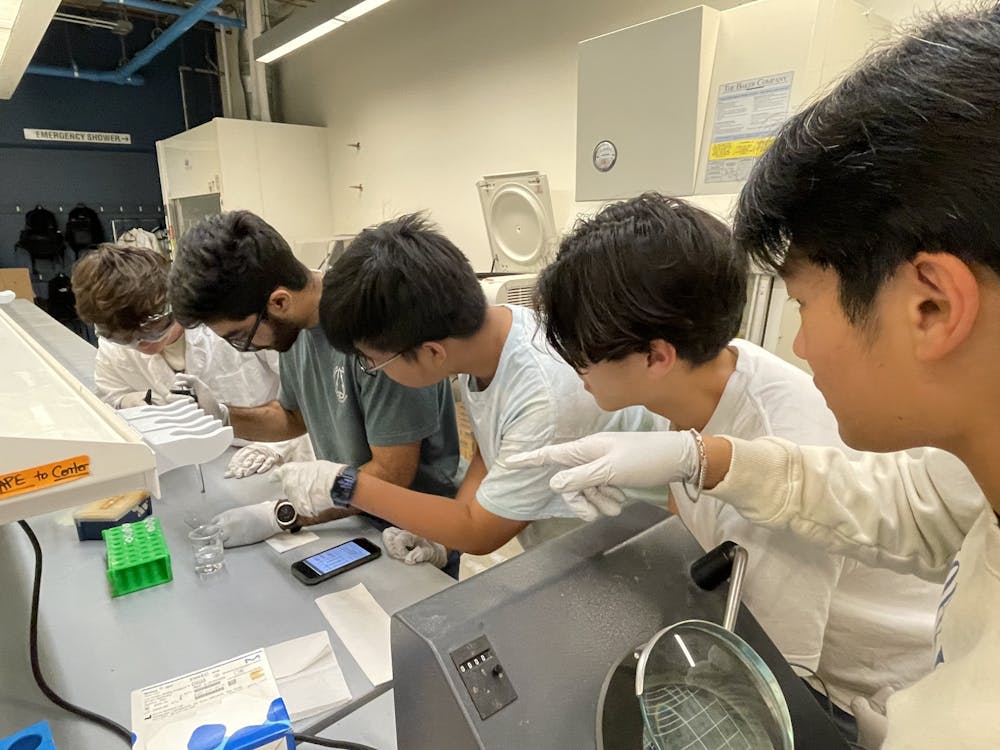Laboratory workshops, collaborative or independent projects, community events and personal fulfillment — Agara Bio brings it all together.
Agara Bio, founded in 2018, is a student-run biology club that provides a lab space for students to delve into biology outside of traditional labs. Today, it has grown into a hub for laboratory workshops, independent projects and collaborative events that bring hands-on research opportunities to students across disciplines.
Jason Bae, a junior majoring in Neuroscience, serves as Agara Bio’s lab manager. By leading workshops, teaching lab techniques and assisting students with their projects, he is a key figure in the club’s current growth and development. For example, Bae led the “Alzheimer’s ELISA workshop” on Sept. 10, 2025, teaching students how to perform serial dilutions, pipette solutions containing various compounds (such as the beta-amyloid plaque proteins characteristic of Alzheimer’s, antibodies and enzymes) and interpret the results of the ELISA test.
To help students with this workshop, Bae taught the scientific mechanisms behind it.
“The ELISA test that we conducted today works by having two antibodies: a primary and a secondary antibody. The primary antibody would attach to the protein, which were beta plaques, and then the secondary antibody would attach to the primary antibody,” Bae stated. “The secondary antibody contains an enzyme that reacts and produces a color change [to blue]. Depending on the intensity of the color, we could determine the concentration of the protein.”
Therefore, a higher concentration of the protein resulted in a color change, indicating the presence of Alzheimer’s disease. Bae explained that the club chose the ELISA test for the workshop because of the wide applications of the method, so learning how to do this test before diving into benchwork would give students a solid foundation to begin with.
While workshops like the ELISA session provide foundational skills, many students dive deeper through independent projects, gaining hands-on experience and contributing to research initiatives. One such initiative, the Genetic Parts Library project, collaborates with the International Genetically Engineered Machine team to create a library of around 300 types of DNA accessible by students.
“With this project, we're actually trying to use the Opentrons robot, which is an auto-pipetter... For me, what I've done in the past is to tweak the robot so that I know how to code for it and make it pipette accurately,” Bae said. “Now, we're trying to do some test runs using some of the genes. If it works, we're going to make it bigger and official among the student members in Agara Bio and then allow them to be part of the project.”
Agara Bio also hosts a variety of other events, such as professor talks where a panel of faculty comes to share research and experiences with club members. Additionally, its annual “IdeaTHON” is a single-day biology-focused hackathon where students develop ideas for actionable research projects and present a pitch to Agara Bio. The top projects are directly supported through equipment and funding provided by the club.
Beyond opportunities for strengthening benchwork skills and initiating independent research projects, Agara Bio offers a supportive on-campus community.
“When I was a freshman and joined Agara Bio, it tended to feel like the upperclassmen were more encouraging and more approachable in terms of asking questions compared to a lab led by a PI,” Bae stated. “It would be great if your research mentor is very active in teaching you, but there are cases where that's not true. Being part of Agara, I think I'm able to approach people who know about the topic more easily.”
The club also offers members the chance to take on leadership roles and experience the reward of guiding others.
“For me, leading a workshop [on gel electrophoresis] for the first time last year, when I became a lab manager, was a significant event,” Bae said. “Seeing the students learn one of the most basic lab techniques and run it successfully was pretty rewarding.”





